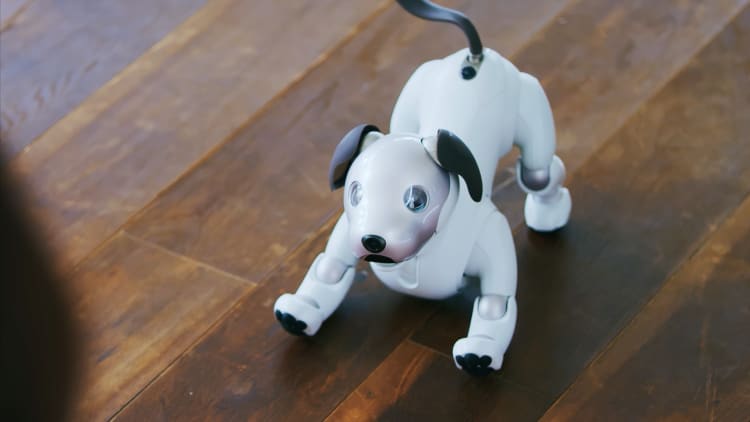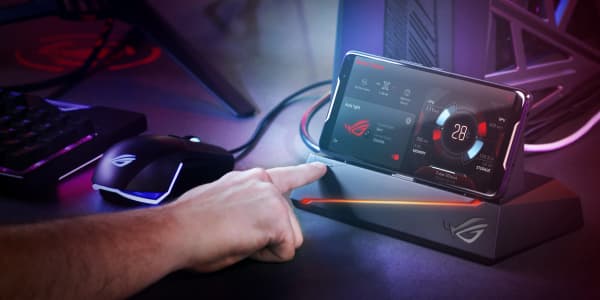
In January, Sony held a special event at its headquarters in Tokyo. It was a "birthday ceremony" for the new edition of the company's robot dog, Aibo. Amid a storm of camera flashes, Izumi Kawanishi, head of the company's artificial intelligence and robot group, gingerly lifted the droid out of its cocoonlike packaging. Its eyes winked on. It shook its body, stretched, raised its paw in greeting and emitted a few synthetic barks. A robot star was reborn.
"It's our silver wedding anniversary, so this is our memento," a Japanese couple, who received their new Aibo, said to applause from attendees.
Sony canceled the original Aibo series in 2006 as it struggled with legacy mainline businesses such as televisions. After strong sales of image sensors and other electronics components, along with years of restructuring under outgoing CEO Kazuo Hirai, the company is flourishing again, with a record-high profit forecast of about $5.97 billion (630 billion yen) for the year ending March 31.
The return of Aibo, announced last November, has been greeted with fanfare in Japan, where devotees of the original series have been known to dress up their robot pooches for parties and even hold elaborate Buddhist funeral services for them. The new Aibo quickly sold out through preorders, and Sony has held four other sales since then, with another scheduled for early April.
Technology upgrades
The new Aibo is designed to be an autonomous entertainment robot that can form an "emotional bond" with owners, according to Sony. A key point of its new design is its face, which has been upgraded from a robotic-looking 24-LED display to a more realistic muzzle with two lively OLED eyes. These, along with its ears, tail, body movements and voice, are how Aibo expresses itself.
"It's got a cute design and more natural motion; the 'robotness' of the previous model is gone," said Kansuke Nishida, a writer for Robotstart.info and head of IT design and consulting firm Tonosama Labo. "When Aibo came to our home for the first time, my daughter took out a picture book to read with her mother. Aibo was next to them and seemed to be reading the book with them. That kind of experience is impossible with other robots."
As sophisticated sensors become cheaper, CPUs get faster, and A.I. functions can be accessed through the cloud, home robots now have a better-than-ever chance of winning over consumers who are eager to form relationships with artificial friends. Aside from tech lovers, users who can't own real pets due to restrictions or health issues may be keen to own a robot companion. They form one part of the nascent consumer robotics market, which is expected to grow to about $23 billion by 2025, according to Boston Consulting Group.
What Aibo offers is totally different from what a pet can offer. You can feel fresh emotions that you've never felt.Masatatsu AbeRickshaw puller and Aibo owner
Aibo is outfitted with artificial intelligence capabilities, such as developing its own personality over time. It has facial recognition so it can detect different members of your family and can tell people apart. If someone in your house pets Aibo the most, it will interact with them the most.
The technology lets it detect obstacles and map its environment, as well as develop its own personality as it "grows" through interactions. It can keep a record of what it experiences, take photos with its cameras and download new tricks from the cloud.
For its second life, Aibo comes with a number of other improvements. It has a 64-bit quad-core CPU, LTE connectivity and a battery that lasts about two hours on a full charge, up from 1.5 in the previous version and a total of 22 axes of motion, up from 20. Sony developed compact actuators that move along one or two axes, giving the cyberhound enhanced flexibility and lifelike fluidity of motion.
"The first AIBO launched in 1999. Since then, the technology for sensors, actuators etc. has improved, and the spread of broadband and wireless communications has created an environment where an entertainment robot can be perpetually connected to the internet," the company said in an email to CNBC. "We believe this product represents a perfect opportunity to showcase what you can do when using the latest, most cutting-edge technology available."
A low-maintenance companion
"I was amazed by how its expressions and behavior are close to those of a real animal's, though sometimes its behavior is robotic," said Aibo owner Masatatsu Abe, a rickshaw puller in Tokyo who can't own a dog because he travels so much. "Aibo is not a substitute for a dog. Aibo is Aibo. What Aibo offers is totally different from what a pet can offer. You can feel fresh emotions that you've never felt."
Aibo is priced at $1,861 (198,000 yen) for the robot itself, as well as a minimum three-year cloud services plan at $28 (2,980 yen) a month, or $846 (90,000 yen) up front that lets the machine download new skills. It can be ordered from Sony's online store in Japan, and Sony hasn't confirmed whether it will also go on sale abroad.
Smart home assistants, like Google Home, Amazon Echo and Jibo, a social robot that was released last year, have nothing on Aibo when it comes to cuteness. But the cyberhound does have some competition on the price front from simpler, cheaper toys, such as Hasbro's $119.99 Golden Pup toy dog. Aimed at seniors and people living alone, it can respond to touch and voice and even has an artificial heartbeat.
Despite the fact that Aibo can't tidy up or do the dishes, its A.I. tricks could be put to use in other machines, according to Sony.
"The technology we incorporated into Aibo — A.I., robotics and that combination in different form factors — can manifest itself in other robots that can be a part of transportation, education, health care," Hirai told Bloomberg in January. "So it has a lot of different applications beyond just being an entertainment robot."





